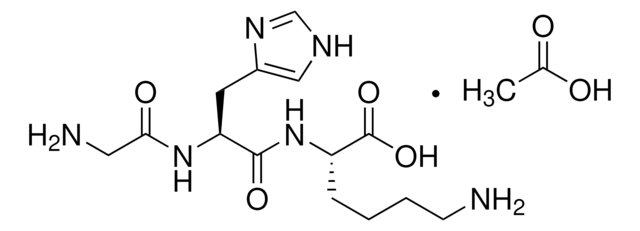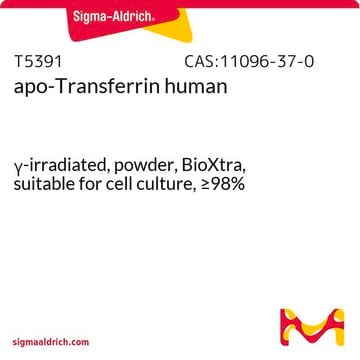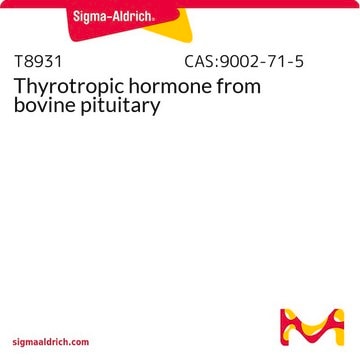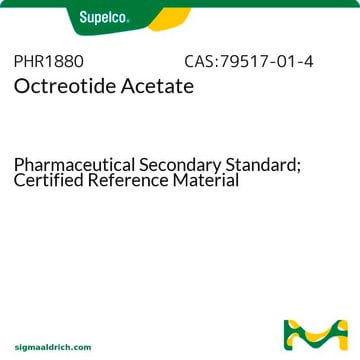S1763
Somatostatin
powder, BioReagent, suitable for cell culture
Synonym(s):
Growth hormone release inhibiting factor, SRIF, Somatostatin-14, Somatotropin release inhibiting factor
About This Item
Recommended Products
biological source
synthetic (organic)
Quality Level
product line
BioReagent
Assay
≥97% (HPLC)
form
powder
technique(s)
cell culture | mammalian: suitable
solubility
H2O: 1 mg/mL
shipped in
ambient
storage temp.
−20°C
SMILES string
[H]N1[C@@H](Cc2ccccc2)C(=O)N[C@@H](Cc3ccccc3)C(=O)N[C@@H](Cc4c[nH]c5ccccc45)C(=O)N[C@@H](CCCCN)C(=O)N[C@@H]([C@@H](C)O)C(=O)N[C@@H](Cc6ccccc6)C(=O)N[C@@H]([C@@H](C)O)C(=O)NC(CO)C(=O)N[C@@H](CSSC[C@H](NC(=O)CNC(=O)[C@H](C)N)C(=O)N[C@@H](CCCCN)C(=O)N[C@@H](CC(N)=O)C1=O)C(O)=O
InChI
1S/C76H104N18O19S2/c1-41(79)64(100)82-37-61(99)83-58-39-114-115-40-59(76(112)113)92-72(108)57(38-95)91-75(111)63(43(3)97)94-71(107)54(33-46-23-11-6-12-24-46)90-74(110)62(42(2)96)93-66(102)51(28-16-18-30-78)84-69(105)55(34-47-36-81-49-26-14-13-25-48(47)49)88-68(104)53(32-45-21-9-5-10-22-45)86-67(103)52(31-44-19-7-4-8-20-44)87-70(106)56(35-60(80)98)89-65(101)50(85-73(58)109)27-15-17-29-77/h4-14,19-26,36,41-43,50-59,62-63,81,95-97H,15-18,27-35,37-40,77-79H2,1-3H3,(H2,80,98)(H,82,100)(H,83,99)(H,84,105)(H,85,109)(H,86,103)(H,87,106)(H,88,104)(H,89,101)(H,90,110)(H,91,111)(H,92,108)(H,93,102)(H,94,107)(H,112,113)/t41-,42+,43+,50-,51-,52-,53-,54-,55-,56-,57?,58-,59-,62-,63-/m0/s1
InChI key
NHXLMOGPVYXJNR-FQSIDJEASA-N
Gene Information
human ... SSTR1(6751) , SSTR2(6752) , SSTR3(6753) , SSTR4(6754) , SSTR5(6755)
Looking for similar products? Visit Product Comparison Guide
Amino Acid Sequence
Application
Biochem/physiol Actions
Somatostatin (SST) is a peptide. It performs several functions like anti-proliferation, pro-apoptosis and anti-migration. Somatostatin performs physiological activities with the help of various G protein-coupled receptor subtypes (SST receptor (SSTR)-1, SSTR2A, SSTR2B, and SSTR3–5).
Physical form
Reconstitution
Storage Class Code
11 - Combustible Solids
WGK
WGK 3
Flash Point(F)
Not applicable
Flash Point(C)
Not applicable
Personal Protective Equipment
Certificates of Analysis (COA)
Search for Certificates of Analysis (COA) by entering the products Lot/Batch Number. Lot and Batch Numbers can be found on a product’s label following the words ‘Lot’ or ‘Batch’.
Already Own This Product?
Find documentation for the products that you have recently purchased in the Document Library.
Customers Also Viewed
Our team of scientists has experience in all areas of research including Life Science, Material Science, Chemical Synthesis, Chromatography, Analytical and many others.
Contact Technical Service











